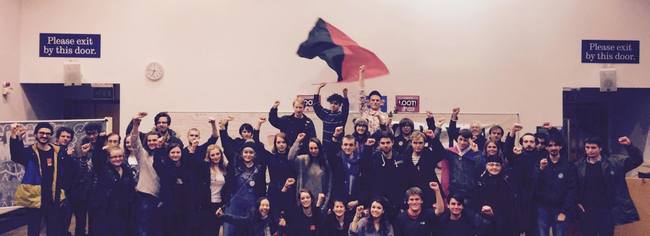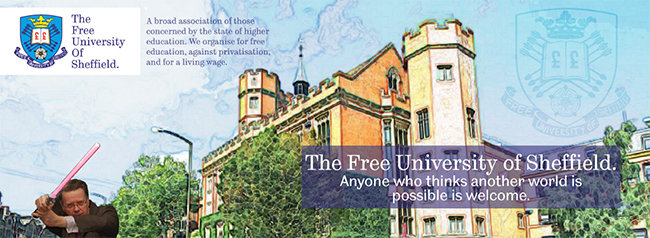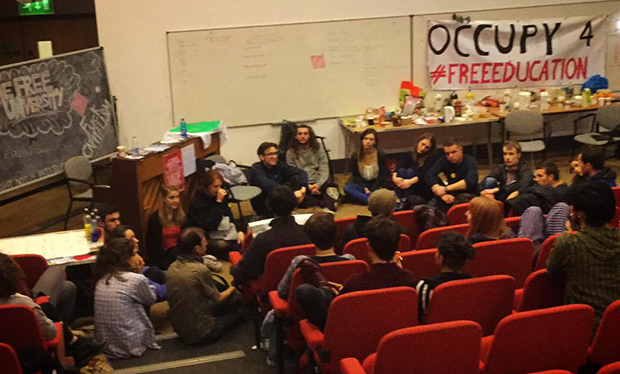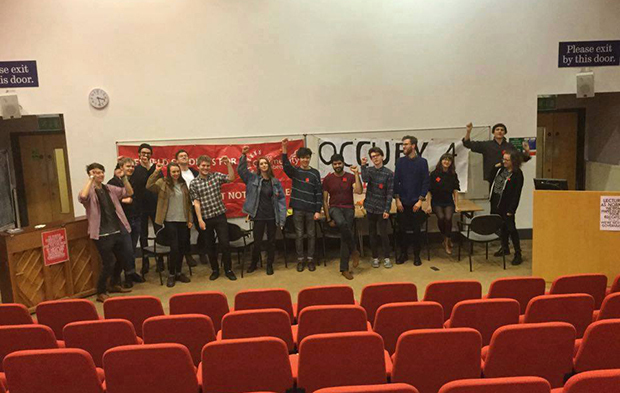“There’s free houmous…”
An occupation of Sheffield University
“Lectures as normal. We don’t want to spoil your education,” says the sign on the Richard Roberts building at The University of Sheffield – “We’re not the government.”
Since Monday 29 February a group of students calling themselves The Free University of Sheffield have occupied a lecture theatre and seminar room. They’re opposing what they say is the “current assault on higher education” and are calling on the university to, among other things, demonstrate “active resistance to the Higher Education Green Paper”, a document which continues and deepens the marketisation of British universities begun by the Brown Report in 2010. The group have had some high profile support. “I support you completely! I wish I was there and could join you.” That’s Richard Roberts, the Nobel prize-winning scientist whose lecture theatre the group currently occupy.
There’s also sympathy within the university for their aims. On the Green Paper, one of Sheffield’s more insightful and vocal critics writes, “I do not believe that the great successes of British Higher Education have been produced, or will be sustained, by further marketisation […] In Sheffield our own students have resisted this line, and see down the road to where it can lead.” That’s Professor Sir Keith Burnett, Vice-Chancellor of the university and Guardian Higher Education Inspiring Leader nominee.
After four days of occupation, when I spoke to the group, the lecture theatre had succumbed to the charms of student life – posters on the walls, unwashed plates lying around and countless pots of houmous. Some of the kettles were also out of action, having been used to make instant noodles. But the mood was positive. They’d hosted a poetry night, a film showing and a lecture, even had some improvised comedy. As Chris Saltmarsh, a second year student of politics and philosophy, explained, “We reclaimed this space to enact the ideal of education we have – non-hierarchical, shared, collaborative. ” Although membership of the group is “fluid,” Chris said they’d had “30 to 40” students occupying the building at any one time. Security staff I spoke to put the peak figure at 20.
What’s the goal? The group want to provoke a university that is already “vocally and publically opposed to marketisation” into “meaningful resistance.” They’re calling on university management to make “public pledges of non-compliance” on the Green Paper and Prevent, the government’s anti-terror strategy which, they say, victimises Muslim students. The group hopes to be the pressure from within, to “push the university in the right direction.” When it comes to the VC himself, as Saltmarsh puts it, “Thanks for the public statements but, really, you need to do more.”
Keeping an eye on all this activity is a team from University security. Stony-faced when I first approached, they are, apparently, quite good natured, although the occupier peace offering of houmous and pitta bread was received with some bafflement. They’re more “bread cakes and bacon” guys, they told me. Both security staff I spoke to were unwilling to reveal their name, rank or serial number, though I was told they had “a good working relationship” with the students. This might be underselling it. In the Quiet Room, the democratically agreed lights out rule had been amended by one security staff member from 12 to 1am because “midnight is too early for students to go to bed.” Another occupier told me that when he’d been spotted putting up a poster on the outside window of the building, the official response was, “I didn’t see that”. “They take them down, we put them up,” explained another. It sounded more like a game than a serious attempt at censorship. Both security staff told me they hadn’t attended university themselves.
In comparison to other Russell Group institutions, Sheffield is a good university to occupy. The students are free to come and go, so food isn’t an issue, and they can easily attend lectures. In contrast, a sit-in at Birmingham in 2014 was broken up by police officers resulting in a number of student suspensions. Tasers were brandished and CS gas used at Warwick while at UCL in 2013, after a hundred officers cleared an occupation, the University of London declared a six-month ban on campus protests.
Sheffield has no record of reporting its own students and members of the Free University group admit they have never been disciplined over their activities, despite organising other occupations. There’s mixed feelings about Sheffield’s benevolent regime. As Saltmarsh put it, “I’m not going to celebrate them for not calling the police on their own students.”
But is anyone listening? When I conducted a thoroughly unscientific poll outside the Students’ Union I found a range of awareness, from complete ignorance to vague knowledge. The more clued-in students tended to be those campaigning for the upcoming Student Officer elections. When the Free University group staged a lunch-time rally, it was mostly to these electioneerers that they were talking – the already engaged persuading the already committed. Chants of “anti, anti, anti, anti-capitalista!” largely fell flat. “There’s free houmous…” got a better response. When I looked around, there were far more students in the library than in the occupied lecture theatre.
University management are paying some attention. Pro-Vice-Chancellor for Learning and Teaching, Wyn Morgan, and Director of Estates, Keith Lilley, met with the students after two days. According to the group, the meeting was brief and polite. “They seemed completely uncommittal, quite aloof,” according to one occupier. The group were told their concerns were being considered but no detail was given.
In an email, Lilley wrote, “We very much appreciated the manner in which the meeting was conducted and we understand that the increasing marketisation of higher education is rightly an issue very close to the hearts of many of our students and staff.” However, occupation is “not a method of protest that we support,” sentiments echoed by the University’s official press release. The group were also advised that “we have started a legal process to gain possession of the space but we would much prefer it if the occupation could be brought to a swift conclusion.” The group are deciding how to respond to legal action.
What’s at stake here is the idea of what a university is and who it is for. The vision of the government is of higher education institutions as engines of economic growth. They provide the skills and expertise for commerce, industry and development. But those skills in themselves only have value in relation to their economic utility. Allowing profession-conscious students to move their tuition fees around an expanded and more open system will ensure institutions which provide value for money will flourish while others wither. In contrast, the idea of knowledge for its own sake – of teachers and learners sharing more than an economic transaction, of a contribution towards the public good which exceeds GDP – is the vision of many currently studying, teaching and researching in our universities.
The Free University of Sheffield has made its allegiance quite clear. The University itself has made strong and coherent public statements on the matter. Markets are not a good model for universities. It would be a grave error to unleash them. But if on paper their aims are the same, in reality occupiers and administrators have very different reputations to lose. In a timely coincidence, just as the University is attempting to remove rebellious students from its buildings, David Willets, the former Universities Minister, is being invited in. No doubt management will extend the same courtesy to their “in conversation” guest as they have to their more vexing members, but the juxtaposition is a stark reminder of the choice facing the University – resist or reform, persuade or refuse?
In the coming battle for the soul of British universities, it remains to be seen who is willing to risk the most – learners, teachers or policy makers? Whose side is the University of Sheffield on? The government’s? Students’? Or its own?
Update
On the 9th March, The Free University of Sheffield called off the occupation. The repossession order had its effect. A statement on their facebook page said:
“Over the duration of this occupation, we aimed to create a space for directly-democratic, cooperative learning to thrive. Whilst this space may have only temporarily existed in the Richard Roberts Auditorium, our vision for a free university remains powerful and relevant. This strength is manifested not just in these ideas, but in the new connections we have made as fellow students and staff resisting the neoliberal university.”
A final picture shows their ranks swelled and defiant.

A smaller group attended the David Willett’s “In Conversation” event a couple of weeks later.
Mr Willetts, or Baron Willetts of Havant, as we should now call him, didn’t seemed too fussed by the attention. The group took up seats at the back of the room and stayed quiet until questions. Speaker one stood up from the Free University - something about “this government fucking this city” and “students not being able to pay tuition fees.” It’s not that I don’t remember. It just didn’t make any sense at the time. An inspiring display of the eloquence and command of argument that a university education might be thought to instill, it was not. Lord(?) Willetts was more than happy to take the moral high ground of being sworn at and point out the counter-intuitive but undeniable fact that higher fees haven’t put off students from low income families, although their overall rate remains low.
Speaker two was much more coherent but still allowed the ex-minister the easy victory of clarifying that students don’t pay to go to university. They pay after. And on £21,000, it essentially ups your income tax from 20% to 29%.
Sadly we didn’t get a chance to talk about at what point a personal fees system might become unsustainable or how tying the majority of university funding to student fees affects the sector more broadly.
If Monsignor Willetts got an unintentionally easy ride from the Free University, the actual University didn’t really seem to be bothering at all. Channelled through the very relaxed and slightly waffly Professor Andrew Gamble, the In Conversation event was friendly to the point of irrelevance. Such questions as “How has your thought on markets developed over the years?” and “Is Labour a spent political force?” are interesting-ish, but not when asked of a recently departed Conservative minister in a university which is publically opposed to the very reforms being proposed. Those reforms, incidentally, didn’t get much of a mention.
I asked Marquis Willetts if he thought the TEF (Teaching Excellence Framework) would be any different from the REF (Research Excellence Framework), which the recent Green Paper noted was expensive, distracting, and controversial (Part D. Ch.2, paragraphs 3 and 7). I think he liked my question and seemed to imply he was very glad he wasn’t in charge of implementing a framework for calculating a cross-sector value for teaching. I told him I was glad he was relaxed about it but some of us aren’t retired yet. We left it, I think, on two points: one, if you must have some measurement for assessing teaching quality (debatable, but not here) then two, it doesn’t matter how clunky or counter-productive it is, just get on with it. I found this dispiriting.
It would be unfair to characterise the attitude of Wyn Morgan, Pro-vice Chancellor for Learning and Teaching, as uninstitutionally cheerful. But every time I glanced over to him on the front row, he did seem to be smiling.
26th March


